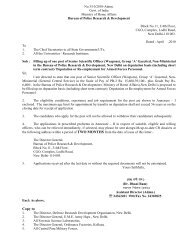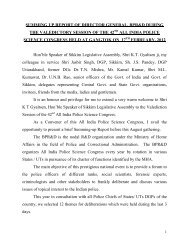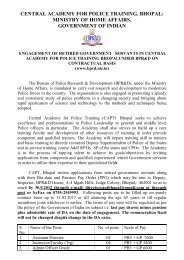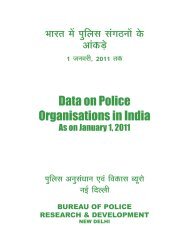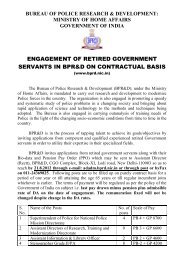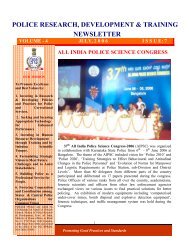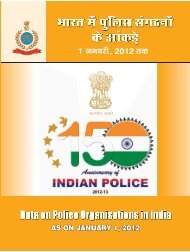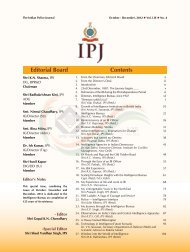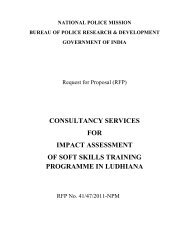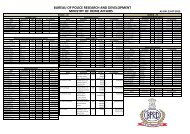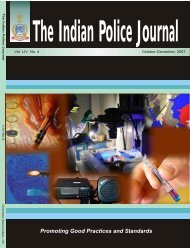April - June 2010 - Bureau of Police Research and Development
April - June 2010 - Bureau of Police Research and Development
April - June 2010 - Bureau of Police Research and Development
- No tags were found...
Create successful ePaper yourself
Turn your PDF publications into a flip-book with our unique Google optimized e-Paper software.
Abstracts & Key Words<strong>Police</strong> Sub-Culture : An Adaptation <strong>of</strong>A Scale for Indian <strong>Police</strong>menDr. Anuradha Bh<strong>and</strong>ari <strong>and</strong> Sarita MalikKey Words<strong>Police</strong> Sub-culture, Crime Fighting, Service,Culture, Organizational Change, Socialization,Policing.AbstractAn underst<strong>and</strong>ing <strong>of</strong> police sub-culture isessential in order to underst<strong>and</strong> the men inkhaki. A police sub-culture not only socializesthe new entrants but also teaches them thevalues, morals <strong>and</strong> various rules <strong>of</strong> policing.Adaptation to police sub-culture makes themmore loyal, aggressive, develop a feeling <strong>of</strong>brotherhood. <strong>Police</strong> sub-culture adherencescale developed by Cochran <strong>and</strong> Bromley(2003) was tested on Indian police <strong>and</strong> anadaptation <strong>of</strong> this police sub-culture scale wasdeveloped for Indian policemen.Singapore Community PolicingExperimentSankar SenKey WordsCommunity Policy, Japanese Model, R<strong>and</strong>omPatrolling, COBAN, Neighbourhood Policy Post(NPC)AbstractWhile police forces in USA <strong>and</strong> as well as inother western countries are still arguing overthe meaning <strong>and</strong> desirability <strong>of</strong> communitypolicing, the Singapore police boldly createdit. As the then Prime Minister <strong>of</strong> Singapore,Lee Kuan Yew said forthrightly, "we havenothing more to learn from the west, it is timeto begin to learn from the east". Singaporedecided to emulate the Japanese model <strong>and</strong>brought about a complete conversion <strong>of</strong> thesystem between the years 1983 to 1989. Allthese changes were made within a shortperiod <strong>of</strong> time <strong>and</strong> without expenditure <strong>of</strong>resources beyond the normal budget.Relevance <strong>of</strong> KPAs & KPIs inPolicing-CID-ADA SivanarayanaKey WordsKey Performance Areas (KPAs), KeyPerformance Indicators (KPIs), Reactive,Extraveneous, CHRI, IPC, SMART Principles,Performance Managment.AbstractThe democratic policing in any country ismeant for human security, protection <strong>and</strong>service to the people, in addition to maintainingorder. The policing plays a vital role in thesociety from every sphere <strong>of</strong> development <strong>and</strong>change. The UK <strong>and</strong> USA measures victims'satisfaction with the service they receive fromthe police. This KPI forms part <strong>of</strong> a PublicService Agreement. The increasing victims'satisfaction is assessed <strong>and</strong> suggestions aremade for future research <strong>and</strong> policyintervention to raise levels <strong>of</strong> satisfaction. Inother countries like Canada, Australia, etc.,different methods are adopted basing onnumber <strong>of</strong> cases reported, preventivemeasures achieved <strong>and</strong> the number <strong>of</strong>convictions attained in a year.4 ➢ The Indian <strong>Police</strong> Journal Vol. LVII-No. 2, <strong>April</strong>-<strong>June</strong>, <strong>2010</strong>




